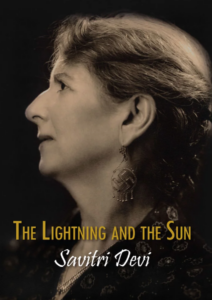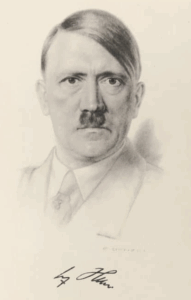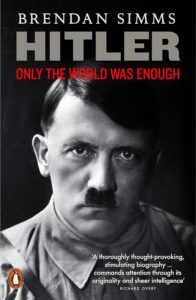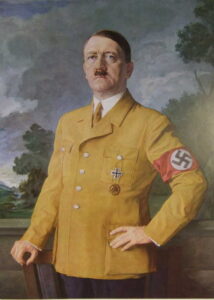and the Sun, 12
Adolf Hitler chose to use the Dark Age weapons because, — contrarily to that other uncompromising champion of Truth, Akhenaton of Egypt, who lived 3300 years before him, — he fully realised that there is, in this world, no peaceful escape from the grip of the Dark forces. He realised it as he experienced that his German people, and, along with them, the whole Aryan race — the youngest creative race of our Time-cycle and the only creative race for centuries; the best — were threatened in their existence by the agents of the Death-powers; cornered; and that their definitive downfall and disappearance would mean the definitive downfall of higher organised Life upon this planet, with no hope of resurrection [red emphasis by Editor]. That experience did not begin on the day Adolf Hitler was told that the First World War was lost for Germany. It had been familiar to him for years. But the news of the loss of the war and then of the infamous Treaties of Versailles and Saint-German imposed upon Germany by her victors, and the sight of the following misery, gave it further depth, further acuteness, and a further tremendous hold on him. A growing sense of emergency, a feverish haste — not unlike that, which one can trace in the building of the capital of King Akhenaton’s ideal State — drove him forwards, defining his whole policy in its positive and negative aspects, at home and abroad, to the end.
His Gospel of Germanic pride and glorious healthy earthly life — ’freedom and bread’ — coupled with the hard blows of the early Storm Troopers’ fists, that kept order in his public meetings and, when necessary, fought his battle in the streets, broke down whatever opposition stood in his way to power. There was, in that blending of mystical insight, elemental logic and well-organised brutality — of truth and youth — that characterises National Socialism, a grandeur that appealed to the masses and to the very best of the best people: to those exceptionally intelligent and reliable men who have retained the raw vitality of the masses within their psychological make-up.
Temporary set-backs[1] only kindled the bitter determination of both. And the struggle started in 1919 was a staggering triumph. On the 30th of January, 1933, Adolf Hitler was acclaimed as Chancellor of the German Reich. A few months later, the Reichstag was to vote him ‘illimited powers,’ so that he might, without hindrance, remould the whole State, and direct Germany’s foreign policy according to his programme — which he consistently did to the extent it could be done in spite of the undermining activities of a well-hidden and — alas! — extremely efficient pack of traitors in Germany itself, and in defiance of the increasing hostility of the whole world, i.e. against the pressure of the coalesced forces of this Dark Age.
It is an error to believe that ‘after a time’ the National Socialist State ‘should have’ — could have, in the first place, — avoided evolving into a ‘police State,’ i.e. a State permanently dominated by the consciousness of emergency. In other words, it is an error to believe that, in 1933, — or 1934 — the struggle was ‘over,’ and conditions of emergency a thing of the past. From the moment Adolf Hitler acquired a free hand to remould the German Reich according to his ideals, the National Socialist struggle merely entered a new phase. It was no longer the struggle for power. But it still was the Struggle for Truth; for cosmic Truth applied to social problems and to politics in our advanced Dark Age, i.e. the Struggle for Truth, with unavoidable Dark Age methods. And for that very reason — because it is the State ‘against Time’ par excellence, — the National Socialist State could (and can, were it again to take shape during this Dark Age) only be a State resting upon an iron coercive and military organisation; a State in which every free citizen feels himself a soldier — a voluntary soldier, glad to submit to integral (inner and outer) discipline, for the advent and defence of Adolf Hitler’s ideal Reich, (the Kingdom of Truth ‘against Time’) — and in which every enemy of the new Order lives under the constant threat of denunciation and arrest, hard labour in a concentration camp, or death; what a well-known hater of the Hitler faith has tried to slander under the name of an ‘S.S. State.’[2] (The word is, in reality, the greatest compliment paid, to the glorious revolutionary State ‘against Time.’)
‘A revolution,’ says Konstantin Hierl, one of the men to whom the National Socialist regime owes the most, in the practical field, ‘can only be a transitory state of affairs, (ein Ubergangszustand). And he adds: ‘Also the absolute system, of government connected with the National Socialist revolution should have been only a transition, and could not be the first aim of a German revolution.’[3]
It is true that revolutions in the usual sense of the word — such as the French Revolution or the Russian Revolution, which are but passages from given conditions ‘in Time’ to different conditions, also ‘in Time’; steps along the downward path of history — can only be ‘transitory states of affairs.’ But it is, from the cosmic standpoint, an error — an understandable error, maybe, yet, a fundamental one, — to consider the National Socialist upheaval as a mere ‘German Revolution’ of the same type as those. Being an upheaval ‘against Time,’ the National Socialist Revolution was, — and, as long as its guiding, Idea lives in the consciousness of a militant minority, remains, a transition, no doubt, but a transition between advanced Dark Age conditions and coming, Golden Age conditions, yet hardly dreamable. And therefore only with the end of the Dark Age — with the end of every influence of the Forces of disintegration and, subsequently, the end of all opposition to the truth it stands for, — can and will ‘the absolute system of government’ connected with it cease to have its justification, and the National Socialist emergency State ‘against Time’ give place to a normal form (which will then be a Golden Age form) of collective life a form devised for a few — very few — god-like men and women, of the best blood, uncontested masters of a beautiful regenerate earth more than broad enough to contain them and their descendants for many generations, and to feed them, without them needing to kill or harm or exploit any living creature; the glorious fulfilment of those very ideals of perfect health and more-than-human strength and beauty that the heroic Third German Reich has striven to impose yesterday, against the current of time, with Dark Age weapons.
That is the proper meaning of Adolf Hitler’s own comments upon the ‘humane pacifist Idea’ according to which every human life is supposed to have such an enormous ‘value.’ The humane pacifist idea is, in fact, perhaps quite good, once the highest type of human being has already conquered and subdued so much of the surface of the world as to make himself the sole lord of this earth,’ writes he, in Mein Kampf.[4] ‘The idea can, in that case, cause no harm, inasmuch as its application’ (meaning: its application in its present-day form) ‘will be rare, and finally impossible’ — ’impossible’ precisely because, then, there will (for very many millenniums at least) no longer exist any politically dangerous or racially inferior elements, capable of corrupting the best and of marring the harmony between actual life and its divine pattern. But now ‘the highest type of human being’ — the best of the best among Nature’s chosen race, — are far from being the ‘sole masters of this earth.’ Now, we are still in the Dark Age, — sinking into it more and more. And therefore comes the logical conclusion of the inspired Man, Founder of the Dark Age State ‘against Time’: Also erst Kampf, und dann vielleicht Pazifismus — ‘So, first struggle, and then, perhaps, pacifism.’[5]
All but a very few people have thoroughly misunderstood — and millions have most unjustly condemned — the coercive methods of the Third Reich and its drastic steps intended to protect Western Aryandom against the Jewish danger (and against the influence of any man-centred, international Weltanschauung, all. of which are, in the West, Jewish products.) They have misunderstood them precisely because they have refused to acknowledge the infinitely more than political significance of National Socialism, and to see, in it, what I have called an upheaval ‘against Time.’ And they have condemned them because, as I have stated in the beginning of this book, evolution in Time goes hand in hand not with a decrease in violence (on the contrary!) but with a steady decrease in honesty regarding violence, and in understanding concerning the right use of it. They have condemned them while tolerating (and, more often than not, defending) all manner of horrors, among others, vivisection, that most degrading of all crimes against Life. They have — unknowingly, perhaps, but in fact, — condemned them, because the drastic coercive and preventive steps taken by the National Socialist State against the actual or potential agents of the Dark Forces had, inasmuch as they were taken in the Führer’s spirit, their full justification in the light of cosmic Truth, which our Dark Age denies; because one had resorted to them not in order to try to find out means of patching up a sickly humanity or of prolonging the life and enjoyment of the vicious, but in order to make possible, here and now, a new world of the strong in which vice and disease would be unknown; because one had resorted to them not ‘for the sake of suffering mankind’ — of mankind in its present-day, contemptible state — but ‘in the interest of the Universe’ in the sense these words are used in the Bhagavad-Gita.
Nay, inasmuch as the men who were trusted to carry out those steps did so selflessly and without passion, simply because I they knew it was their duty as Aryan fighters for the Cause of Truth, they acted exactly as the Blessed One has urged warriors to act. And one can safely say that, despite all individual cases of unfaithfulness to the spirit of detached Violence (cases with which one is bound to reckon, at such an advanced stage of the Age of Gloom as the one in which we are living) no state in history has, as a whole, embodied the moral outlook of the Bhagavad-Gita, as the Third German Reich has done.
That was enough for typical Dark Age people — people whose man-centred moral outlook is the exact opposite of that expressed both in the oldest Book of Aryan wisdom and in Adolf Hitler’s words and deeds and regulations, — to feel personally threatened through the mere existence of such an organised power ‘against Time,’ and to hate it.
And that hatred is, as we shall see, the real cause of the Second World War.
___________
[1] Such as the failure of the putsch of the 9th November 1923.
[2] This is the title of one of Eugen Kogon’s books against the Third Reich [published in 1946—Ed.]
[3] Konstantin Hierl, In Dienst für Deutschland, p. 121-122.
[4] Mein Kampf, p. 315.
[5] Mein Kampf, p. 315-316.
______ 卐 ______
The Lightning & the Sun by Savitri Devi (Counter-Currents Publishing, 2014, unabridged edition) can be ordered here.




